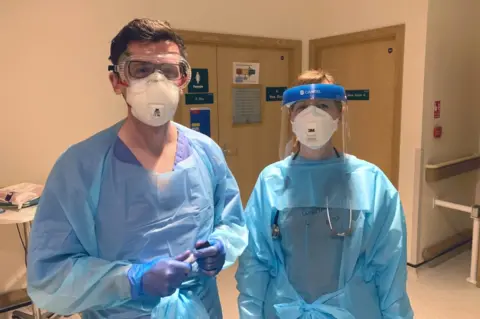Coronavirus doctor's diary: A time when people say 'Have you got a will?'
 John Wright
John WrightAs relatives are banned from visiting patients with Covid-19 it's natural that they telephone for information, but the sheer volume of calls was creating problems at Bradford Royal Infirmary. So, as Dr John Wright explains, the hospital had to try some new ideas.
Monday 13 April
In normal times, Easter would be a special day for families to come together, in hospital just as anywhere else. That is now impossible. In our hospital, fathers, mothers, sons and daughters have to be separated from their loved ones.
Many people have been telephoning instead, but staff on the wards are run ragged at the moment. To take the pressure off them, the hospital set up a new phone line, where nurses and admin staff use medical records to give accurate information in a calm environment.
In the first week, the new team took 1,300 calls. We started off with four lines and now we're up to eight and are possibly extending that as well. And it's not just health updates that people need.
Allow X content?

Emily, a staff nurse working on the Relatives' Line, told me about a call from a woman whose father was in intensive care, but fully conscious, and wanted to rewrite his will. This is one of those times when people say, "Have you got a will?" - so I think she is right that we are going to see more and more of this.
Emily also told me about a call from a woman whose husband was in the intensive care unit (ICU) on a ventilator. The woman was greatly distressed and just wanted to tell her husband to "wake up".

 John Wright
John WrightProf John Wright, a medical doctor and epidemiologist, is head of the Bradford Institute for Health Research. He has looked after patients in epidemics all over the world, including cholera, HIV and ebola outbreaks in sub-Saharan Africa. Over the next few weeks he will be reporting for the BBC on how his hospital, the Bradford Royal Infirmary, is coping with Covid-19.
Read his previous diary entries:

"I offered the option of sending a message to him, because I know ICU nurses do talk to their patients while they're on ventilators," Emily told me. "And so I typed up a message for them to relate to him."
There is now also a dedicated email inbox that enables to people to send personal messages or photographs, which are printed out and taken to their loved ones, and there will soon be a website where people can do this too. One of the Bradford schools has also made a fab postcard that staff can write shorter messages on and deliver to the wards.

I spoke to one nurse after she came off a phone call with a woman whose mum was dying of Covid-19 in the hospital. The caller's mother had originally gone into hospital for an operation on her hip but had been diagnosed with coronavirus. The daughter had been told that she couldn't visit and had, understandably, been really distraught about that.
She was then able to email in a letter. This was sent to the nurses on the ward and it gave her great comfort to know that staff had sat with her mum and read the letter out to her.
We have taken away everybody's liberty to visit, and it's absolutely right that we should use technology to keep people in contact with each other.
On the Covid wards, patients are in various stages of illness, from acute attacks to slow remission. The fact that they aren't allowed visits means that nursing staff are trying even harder than usual to support patients emotionally, respiratory consultant Leanne Cheyne tells me.
"It's quite scary because this is a condition we've never seen before. I think everyone's really interested to know if we've got others like them and whether they have recovered," she says.
Being reassured about the recovery of other patients is helpful for them, she says. "It gives them more hope about what the future might bring.
Allow X content?

Three weeks after the UK lockdown was belatedly announced, we've now had over 300 definite cases of Covid-19. Of those, 46 have died.
Of course, we are used to patients dying in hospital, but not at this rate, so changes have also had to be made in the hospital's mortuary.
Martin Walker, the mortuary manager, tells me that he previously had one co-worker. Now there are five members of staff, instead of two, and they are working seven days per week.
Contingency plans for a further surge in deaths are also being made - preparations are being put in place to store bodies temporarily at a location outside the hospital, if this becomes necessary, and to staff the mortuary 24 hours a day. This is partly so that funeral directors, whose refrigerators are full, Martin says, can come and collect bodies whenever they are able to.

Listen to John Wright
- John Wright is recording from the hospital wards for BBC Radio 4's The NHS Front Line
- You can hear the next episode at 11:00 on Tuesday 14 April, catch up with the previous episodes online, or download the podcast

"It's important that we have a constant flow of release to help us with our capacity issues," Martin explains.
Some of the changes Martin is dealing with are similar to those taking place on the wards.
 John Wright
John WrightPeople who have died with Covid-19 will still be infectious, so it is important for any mortuary staff handling bodies to wear personal protective equipment.
He also has to be aware of the potential emotional impact on his staff.
"We're talking about a surge that could be quite emotive when you're dealing with so many deaths in a short space of time," he says.
"We're going to expect all ages, and I have to prepare them for children and younger people. So until that comes, I think it's difficult to assess how everyone copes."
And here in the mortuary too, the hospital's policy is that no visitors are allowed, so Martin has had to turn bereaved people away.
So far they have been understanding.
"They fully understand that we, as NHS workers, we have to make that decision and look after everyone else and staff and our families," Martin says. "So it's upsetting for them. It's upsetting for us to do that. But it's understandable at the moment."
Follow @docjohnwright on Twitter

- A SIMPLE GUIDE: How do I protect myself?
- AVOIDING CONTACT: The rules on self-isolation and exercise
- LOOK-UP TOOL: Check cases in your area
- MAPS AND CHARTS: Visual guide to the outbreak
- STRESS: How to look after your mental health

